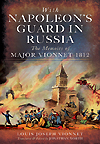
With Napoléon’s Guard in Russia: The Memoirs of Major Vionnet, 1812, translated and edited by Jonathan North, Pen & Sword Books, Barnsley, United Kingdom, 2013, $29.95
Major Louis-Joseph Vionnet served in the Fusilier-Grenadiers, a regiment of Napoléon Bonaparte’s Middle Guard. Born in 1769 as the son of an agricultural laborer, Vionnet volunteered to defend the French Revolution from the invading armies of Prussia and Austria, and fought in Napoléon’s 1796 and 1800 Italian campaigns before being promoted to captain when the empire was established in 1804. He then fought at Austerlitz and in Spain, and by the time Napoléon invaded Russia, Vionnet was a major in charge of the regiment’s 1st Battalion.
Vionnet was wounded during the French retreat from Moscow, but as Jonathan North—the meticulous editor of his 1812 journal—states, “The vast majority of the regiment was left in the Russian snow.” Although ennobled by Napoléon in 1813, Vionnet’s anger against the emperor for what had happened to his comrades in Russia, and his natural conservatism, led him to support the Bourbons, and he even persecuted Bonapartists when given command of the Rhone Department.
This book comprises Vionnet’s 100-page account of the French army’s crossing of the Niemen River; the destruction of Smolensk; the Battle of Borodino and its aftermath; the burning of Moscow; Napoléon’s rescue from Cossacks after the Battle of Maloyaroslavets; the crossing of the Berezina River; and the recrossing of the army into Poland as an utterly shattered force reduced to just 6 percent of its original strength.
A schoolmaster in private life, Vionnet had a fine command of language, which makes his journal immensely readable, with many fascinating insights. “In order to get some water, it was necessary to travel far from the field of battle,” he wrote of Borodino. “Any water to be found on the field was so soaked with blood that even the horses refused to drink it.”
—Andrew Roberts




